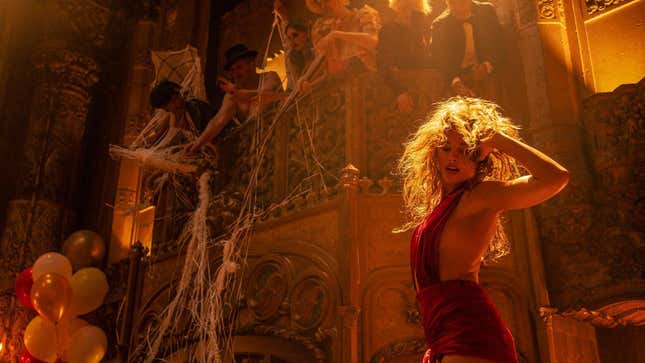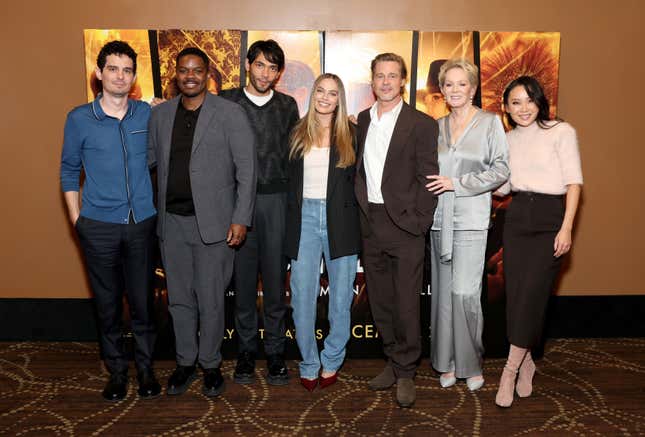‘Babylon’ Is a Depraved, Disgusting Ode to Hollywood
Damien Chazelle's three-hour bacchanal is messier than most big-budget films have the nerve to be. It never bores.
EntertainmentMovies

“Welcome to the asshole of Los Angeles!” announces Tobey Maguire’s off-kilter criminal character James McCay—red circles around his eyes, affect like Pee-wee Herman after a quaalude—deep into the three-hour epic Babylon. At this point, he feels like a proxy for writer/director Damien Chazelle. Within Babylon’s first five minutes, Chazelle welcomes us to the open asshole of an elephant that’s being transported to a bacchanal. Midway up a hill, the elephant starts shitting gallons of brown liquid and softball-sized pellets. Some of the Yoo-hoo-looking fecal juice splashes on the camera, like you sometimes see with blood in battle scenes.
Babylon is many things, but above all else it is crass. The first glimpse of the wild party the elephant is on its way to attend involves a woman squatting and pissing all over a guy who’s giggling on the floor of a bedroom. Another character pisses himself when he’s threatened. Yet another vomits all over the floor of a party and then on its host. The movie, which spans the late 1920s and early 1930s, when movies went from silent to talkies, is certainly not above a fart joke to prove a point. A man strikes up a conversation about the imminent dawn of talking pictures with Brad Pitt’s silent-movie-star character, Jack Conrad. Naturally, they’re at adjacent urinals. “You think people want that, though? Sound in their movies?” asks Jack. Cue massive ass rumbling and a pile of shit plopping into the toilet from a nearby stall. “Yeah. Why wouldn’t they?” says the other guy. Heh.
It’s astonishing in 2022 to see such an expensive movie being so nasty—few outside of Paul Verhoeven have ever attempted this kind of biggish-budget (reportedly $78 million) crudeness, and not in a long while. It’s as though Chazelle is taking the phrase “go for broke” literally with this narrative of Old Hollywood’s transition into slightly less old Hollywood. The idea is to show the underbelly, to explain that things behind the scenes were far less refined than movie magic would ever allow conveyed, but the effect so often is like watching a guy chew his food with his mouth open and then show off the big mass of pre-swallowed mush proudly.
Chazelle has said that he studied a number of movies in this paean to cinema—the production notes list examples as disparate as D. W. Griffith’s Intolerance (1916), Federico Fellini’s La Dolce Vita (1960), and Paul Thomas Anderson’s There Will Be Blood (2007). Not listed but certainly in the director’s debt are the funny, quasi-socially aware, and unabashedly trashy works of Verhoeven and Russ Meyer, the latter of whose depictions of wild Hollywood parties in Beyond the Valley of the Dolls (1970) Chazelle has ripped off wholesale. As in the Meyer flick, Chazelle rapidly shuffles in and out of various social interactions, animating a series of non sequiturs, enticing with a bombardment of goofy randomness. This includes a split-second shot of a woman shoving a dildo up the ass of a slightly bent-over guy during the movie’s velvet-trimmed, opening orgiastic party (which really just looks like a night at The Box to me), and, in a different montage, Jack shouting, “And then he says, ‘Frankly, Scarlet, you’re a cunt!’” We are to delight in the very, “Wait, what did I just see”-ness of it all.-

-

-

-

-

-

-

-

-

-

-

-

-

-

-

-

-

-

-

-

-

-

-

-

-

-

-

-

-

-

-

-

-

-

-

-

-

-

-

-









































